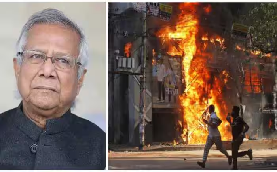Mohammad Yunus, the head of Bangladesh’s interim government, has criticized former Prime Minister Sheikh Hasina for making political comments from India, stating that it is inappropriate. Yunus also mentioned that Hasina should remain silent unless Dhaka formally requests her extradition to avoid straining relations between the two countries.
In an interview with PTI, Yunus said, “If India wants to keep Hasina until Bangladesh requests her return, the condition should be that she must remain silent.” He emphasized that while Bangladesh values strong relations with India, New Delhi should move beyond the narrative that portrays political parties other than the Awami League as Islamic and suggests that the country would be akin to Afghanistan without Hasina.
Hasina resigned from the Prime Minister’s office amid ongoing protests and sought asylum in India, leading to Yunus’s appointment as the head of the interim government. Yunus expressed discomfort with Hasina’s statements from India, noting that her remarks are causing issues. He said, “Everyone is uneasy with her stance because there is a desire to bring her back for prosecution… Her statements from India are problematic. If she had remained silent, we could have overlooked it. But she continues to speak and issue directives, which is unacceptable.”
Yunus was likely referring to Hasina’s August 13 statement calling for ‘justice’ and demanding identification and punishment for those involved in recent acts of terrorism, killings, and brutality. Yunus remarked, “This is not good for either India or us. It is causing trouble.”
Hasina has been in India for about four weeks, fueling speculation in Bangladesh. When asked if Bangladesh had communicated its stance to India, Yunus confirmed that a firm oral message had been conveyed that she should remain silent. He added, “Everyone understands this. We have firmly stated that she should be quiet. This is unfriendly behavior towards us. She has sought asylum there and is running a campaign from there. She did not leave under normal circumstances but fled after people’s revolt and public outcry.”
Yunus stated that the interim government is committed to ensuring justice for the people of Bangladesh and that it is crucial for Hasina to be brought back to face trial for the atrocities she has committed. He emphasized, “Yes, she must be brought back; otherwise, the people of Bangladesh will not find peace. She should face trial here for the atrocities she committed.”
Yunus also discussed the future of relations between India and Bangladesh, expressing a desire for good relations but stressing that New Delhi must abandon the narrative that only Hasina’s leadership can ensure the country’s stability. He said, “To move forward, India must move beyond this narrative. The narrative that everyone else is Islamic, that the BNP is Islamic, and that the country will become Afghanistan without Hasina. India is enamored with this narrative. India needs to move beyond it. Bangladesh is just another neighboring country.”
In response to recent attacks on Hindu minorities in Bangladesh and India’s concerns about them, Yunus dismissed these as mere excuses. He noted that amidst the chaotic environment in Bangladesh, Hindu shops, properties, and temples have been vandalized.
On improving relations between India and Bangladesh, Yunus suggested that both countries need to work together as the current relations are strained. He said, “Relations are currently poor, and we need to work together to improve them.”
Regarding the future of bilateral agreements with India, Yunus mentioned that there are calls for reconsideration of agreements such as the transit and Adani power deals. He stated, “Everyone says there is a need. We will see what the documents say and what the ground reality is. I cannot answer specifically. If a review is necessary, we will question it. The BNP has said that if it comes to power, it will review and reassess the ‘suspicious’ Adani power deal signed during the Awami League administration, as it is putting ‘too much pressure’ on the people of Bangladesh.”



